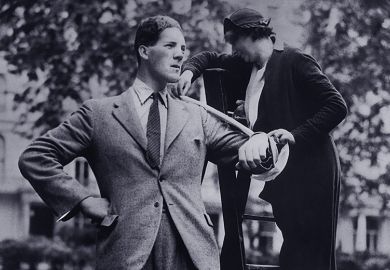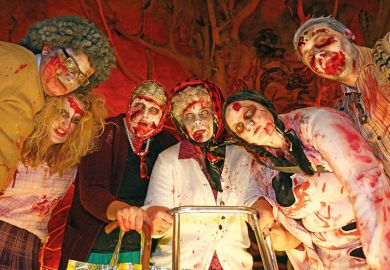Head counts
Our newly appointed Head of Academic Measurement, Mr Lionel Canard, has vigorously denied the widespread campus rumour that he intends to add cranial measurement to the present methods of assessing academic performance.
However, Mr Canard told our reporter Keith Ponting (30) that “in all fairness” he could see no “substantive difference” between the use of such a measurement as a guide to intelligence and the current employment of the teaching excellence framework as an indicator of teaching quality.
“After all, a brief glance at the proposed operation of the future TEF by no less a person than Guy Nason, vice-president for academic affairs at the Royal Statistical Society, makes the following reservations. I quote:
- “…the latest proposals give us little confidence in the future trustworthiness, quality or value of the TEF as a whole”
- “…it seems wrong that key statistical design issues could be decided by unscientific opinion polls”
- “We are also concerned about the (TEF’s) curious proposed system to feed subject rankings back into the provider ranking, which strikes us as unnecessary and statistically dangerous”
- “…the consultation recognises that there are not only substantial differences in scale for the various subject metrics but also wildly different metric clustering, which is nigh impossible to reconcile into a set of simple, meaningful statistics”
- “…the strong likelihood of institutional gaming, which can be played out most effectively within systems such as the TEF”
- “Overall, we believe that the consultation’s statistically inadequate approach would lead to distorted results, misleading rankings and a system that lacks validity and integrity.”
“All in all,” added Mr Canard, “it’s rather difficult to understand why universities that will earn gold, silver or bronze status from such gross statistical anomalies should have any objections to someone assessing the intellectual capacity of their academic staff with a pair of calipers and a tape measure.”
CUC success
“A refreshing vote of confidence in the value of grossly inflated salaries.”
That was how our vice-chancellor responded to the news that the Committee of University Chairs had watered down original proposals to monitor the size of vice-chancellors’ emoluments.
He particularly welcomed the CUC’s refusal to move towards any automatic censuring of absurdly high salaries. “Although universities will now have to provide some sort of explanation for the greed of individual vice-chancellors, this should only involve the type of creative writing that this university has already pioneered in its research excellence framework and teaching excellence framework submissions.”
But our vice-chancellor reserved special praise for the CUC’s refusal to ban vice-chancellors from sitting in on their own remuneration committees. “As I’ve previously made clear, I not only leave the room and stand outside in the corridor when my own salary comes up for debate but now ensure absolute integrity by ensuring that my hands are placed firmly over my ears.”
But would this be enough to clamp down on the some of the truly excessive salaries enjoyed by vice-chancellors from low-ranking universities?
Our vice-chancellor acknowledged that this was an interesting question, but excused himself from further conversation as the sun was shining and he had already committed himself to a celebratory trip round Lake Windermere aboard the University of Bolton vice-chancellor’s private yacht.
Register to continue
Why register?
- Registration is free and only takes a moment
- Once registered, you can read 3 articles a month
- Sign up for our newsletter
Subscribe
Or subscribe for unlimited access to:
- Unlimited access to news, views, insights & reviews
- Digital editions
- Digital access to THE’s university and college rankings analysis
Already registered or a current subscriber?



